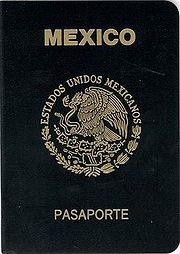
Mexican nationality law
Encyclopedia

Constitution of Mexico
The Political Constitution of the United Mexican States is the current constitution of Mexico. It was drafted in Santiago de Querétaro, in the State of Querétaro, by a constitutional convention, during the Mexican Revolution. It was approved by the Constitutional Congress on February 5, 1917...
. The 32nd article establishes that a separate nationality law is to regulate the exercise of the rights given by Mexican legislation to those Mexicans that also possess another nationality and to establish the norms to avoid the conflicts generated by the use of double nationality. This law was last modified in 2005.
In general terms, Mexican nationality is based on both the principle of jus soli
Jus soli
Jus soli , also known as birthright citizenship, is a right by which nationality or citizenship can be recognized to any individual born in the territory of the related state...
and the principle of jus sanguinis
Jus sanguinis
Ius sanguinis is a social policy by which citizenship is not determined by place of birth, but by having a parent who are citizens of the nation...
. The Mexican constitution also makes a distinction between a national of Mexico and a citizen of Mexico.
Acquisition of nationality
According to the 30th article of the Constitution of MexicoConstitution of Mexico
The Political Constitution of the United Mexican States is the current constitution of Mexico. It was drafted in Santiago de Querétaro, in the State of Querétaro, by a constitutional convention, during the Mexican Revolution. It was approved by the Constitutional Congress on February 5, 1917...
, there are two ways in which a person can acquire the Mexican nationality, by birth and by naturalization.
Nationality by birth
The constitution declares that Mexicans by birth—that is, natural born Mexicans—are:- those individuals born in Mexican territory regardless of the nationality of their parents;
- those individuals born abroad if one or both of their parents was a Mexican national born in Mexican territory;
- those individuals born abroad if one or both of their parents was a Mexican national by naturalizationNaturalizationNaturalization is the acquisition of citizenship and nationality by somebody who was not a citizen of that country at the time of birth....
; and - those individuals born in Mexican merchant or Navy ships or Mexican merchant or Army aircrafts
Nationality by naturalization

- those that obtain from the Secretariat of Foreign AffairsSecretariat of Foreign Affairs (Mexico)The Secretariat of Foreign Affairs is the government department responsible for Mexico's foreign affairs.-Missions:Mexico currently has:* 73 Embassies* 33 Consulates-Generals* 35 Consulates...
a letter of naturalization; and - the man or a woman married with a Mexican national, that reside in Mexican territory and that fulfill all the requirements set forth in the Mexican nationality law, namely to have lived with his or her spouse for two years immediately prior to the date of his or her application.
The Nationality Law establishes also that a foreigner that wishes to naturalize must:
- present their application to the Secretariat of Foreign Affairs;
- formulate the renunciation and taking of the oath of nationality once this has been given;
- prove that she or he speaks SpanishSpanish languageSpanish , also known as Castilian , is a Romance language in the Ibero-Romance group that evolved from several languages and dialects in central-northern Iberia around the 9th century and gradually spread with the expansion of the Kingdom of Castile into central and southern Iberia during the...
, knows the history of the country and has integrated to the national culture; and - prove that she or he has lived in Mexico for five years immediately prior to the submission of the application, or
- two years of residency if:
-
-
- she or he is a direct descendant of a Mexican by birth; or
- is the mother or father of a Mexican by birth; or
- is a national of a Latin AmericaLatin AmericaLatin America is a region of the Americas where Romance languages – particularly Spanish and Portuguese, and variably French – are primarily spoken. Latin America has an area of approximately 21,069,500 km² , almost 3.9% of the Earth's surface or 14.1% of its land surface area...
n or IberianIberian PeninsulaThe Iberian Peninsula , sometimes called Iberia, is located in the extreme southwest of Europe and includes the modern-day sovereign states of Spain, Portugal and Andorra, as well as the British Overseas Territory of Gibraltar...
country; or - to the judgment of the Secretariat, she or he has performed or created outstanding works in a cultural, social, scientific, technical, artistic, sports or business area that benefit the nation, in which case, the foreigner is not required to have resided in the country for the number of years prescribed in the law; or
- one year of residency if she or he as been adopted by a Mexican national, as well as all minors, who are second generation descendants, and who have been under tutelage of a Mexican national.
-
Possession of the Mexican nationality

- to take their children or pupils to public or private schools to receive preschool, primary and secondary education; as well as military education as and if required by the law;
- to present themselves in the days and hours designated by the municipalities in which they reside to receive civic and military instruction;
- to enlist and serve in the National Guard to defend the independence, territory, honor, rights and interest of the nation;
- to contribute to the public expenditures through their taxes;
Documents that serve as proof of nationality are:
- birth certificates;
- letter of naturalization;
- passports;
- national identity cards, and
- consular identity cards if they have a digital photograph, a magnetic band and a holographic identification.
Mexican citizenship
As in most other Central and South American countries, Mexican law differentiates between nationality and citizenship. Nationality is the attribute of the person in international law that describes his/her relationship to the State, whereas citizenship is given to those nationals (i.e. those that hold the Mexican nationality) that have certain rights and responsibilities before the State. The 34th article of the Mexican constitution establishes that Mexican citizens are those Mexican [nationals] that are 18 years of age or older, and that have an "honest way of living". Mexican citizens have the rights to:- vote in all elections;
- be elected in all elections;
- gather or associate freely in in order to participate in the political affairs of the nation;
- enlist in the Mexican ArmyMexican ArmyThe Mexican Army is the combined land and air branch and largest of the Mexican Military services; it also is known as the National Defense Army. It is famous for having been the first army to adopt and use an automatic rifle, , in 1899, and the first to issue automatic weapons as standard issue...
or the Mexican National Guard to defend the Republic and its institutions, and - exercise the right of petition.
Mexican law also distinguishes between naturalized citizens and natural-born citizens in many ways. Under the Mexican constitution, naturalized citizens are prohibited from serving in a wide array of positions, mostly governmental. Naturalized Mexicans cannot occupy any of the following positions:
- The Mexican military during peacetime
- Policeman
- Captain, pilot, or crew member on any Mexican-flagged vessel or aircraft
- President of Mexico
- Member of the Congress of Mexico
- Member of the Supreme Court of Mexico
- Governor of a Mexican state
- Mayor or member of the legislature of Mexico City
Loss of nationality and loss of citizenship
The 37th article of the constitution establishes that Mexicans by birth—natural born Mexicans—cannot be deprived of their nationality under any circumstance, such as, and as defined in the Nationality law, the acquisition of another nationality. However, naturalized Mexicans can lose their nationality if:- they voluntarily acquire another nationality, present themselves as foreigners or accept nobility titles that imply a submission to a foreign State; and if
- they reside for five continuous years in a foreign country.
Even though Mexican nationals by birth cannot lose their nationality under any circumstance, Mexican citizenship, and thus its prerogatives, can be lost if a person:
- accepts nobility titles from foreign countries;
- serves in a foreign government without the authorization of the Congress of the Union;
- accepts or uses foreign distinctions, titles or functions, without the authorization of the Congress of the Union, with the exception of those that are literary, scientific or humanitarian in nature;
- helps a foreign citizen or government, and against Mexico, in any diplomatic claim or before an International Tribunal.
Multiple nationality
The Mexican nationality law acknowledges that a Mexican by birth can also possess another nationality. If that is the case, however, such an individual must always enter and leave the country as a Mexican (i.e. by presenting a Mexican proof of citizenship). The law also established that, regardless of possession of another nationality an individual will always be considered a Mexican national —that is, she or he cannot claim protection from a foreign country in judicial cases— if:- she or he participates in an entity's or company's capital if these are constituted according to the Mexican law; if
- she or he gives credits to such entities; and if
- she or he possesses property in Mexican territory.
All Mexican nationals by birth that possess another nationality cannot be elected for or work in public office only in those cases that the law clearly establishes that they must not acquire another nationality. If in such a case, and if a Mexican national by birth is also considered a national by another country directly or indirectly, she or he can request a Certificate of Nationality from the government, whereby she or he must renounce her or his other nationality.
See also
- Mexican passportMexican passportMexican passports are issued to Mexican citizens for the purpose of traveling abroad. The Mexican passport is also an official ID and proof of Mexican citizenship.-Types of Passports:...
- Secretariat of Foreign AffairsSecretariat of Foreign Affairs (Mexico)The Secretariat of Foreign Affairs is the government department responsible for Mexico's foreign affairs.-Missions:Mexico currently has:* 73 Embassies* 33 Consulates-Generals* 35 Consulates...
External links
- Mexican nationality by law (Spanish)
- Requirements for acquisiton of Mexican nationality (Spanish)

